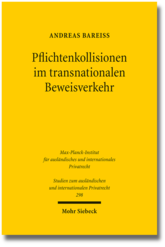The University of Trier will hold an academic ceremony commemorating the late Professor Dr. Bernd von Hoffmann (1941-2011), on November 28, 2014. Bernd von Hoffmann held a Chair in Private Law, Comparative Law and Private International Law at the University of Trier from 1979 to 2007 and is recognized as one of the leading scholars of his generation, particularly in the fields of private international law and arbitration. The ceremony will be followed by a symposium (in German) dealing with „Structural asymmetries in international dispute resolution“ on November 29, 2014. The ceremony and the symposium are organized by von Hoffmann’s academic pupils, Professor Dr. Herbert Kronke, LL.M., University of Heidelberg, who is currently serving as a judge with the Iran-United States Claims Tribunal in The Hague, and Professor Dr. Karsten Thorn, LL.M., Bucerius Law School, Hamburg, in close collaboration with the Institute for Legal Policy at the University of Trier and the University’s law faculty.
The program is as follows:
Friday, November 28, 2014 – 17.30
Welcome Addresses
Professor Dr. Mark A. Zöller, Dean, Faculty of Law, University of Trier
Professor Dr. Michael Jäckel, President, University of Trier
Zur Person Bernd von Hoffmann
Professor Dr. Herbert Kronke, LL.M., University of Heidelberg; Judge, Iran-United States Claims Tribunal, The Hague
Privatautonomie und Parteiautonomie: (familienrechtliche) Zukunftsperspektiven
Professor Dr. Dr. h.c. mult. Dieter Henrich, University of Regensburg
Saturday, November 29, 2014 – 9.00 – 14.00
Welcome Address
Professor Dr. Gerhard Robbers, Minister of Justice, Rhineland-Palatinate
Der Schutz des Geschädigten bei grenzüberschreitenden Delikten im europäischen Zivilprozessrecht
Professor Dr. Jan von Hein, University of Freiburg/Germany
Grenzüberschreitende Rechtsdurchsetzung und Gemeinsames Europäisches Kaufrecht
Professor Dr. Jens Kleinschmidt, LL.M., University of Trier
Schiedsvereinbarungen in Fällen struktureller Unterlegenheit – hinreichende Schutzmechanismen oder Regelungslücken?
Professor Dr. Karsten Thorn, LL.M., Bucerius Law School, Hamburg
Kollektiver Rechtsschutz im Schiedsverfahren
Professor Dr. Thomas Rüfner, University of Trier
Justice is open to all – like the Ritz Hotel: Schiedsvereinbarungen im Sport
Dr. Francesca Mazza, Deutsche Institution für Schiedsgerichtsbarkeit


